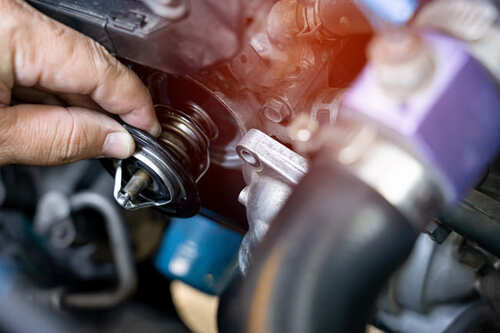
Vauxhall Mokka: common faults
Is your Vauxhall Mokka playing up? Not sure where to start when diagnosing the problem? Maybe this guide will help you find the cause and solution.
Water pump problems
This component is responsible for pumping the engine coolant around the cooling system and preventing the parts from overheating. If the pump fails and is left untreated, you may see signs of thermal damage such as cracked cylinder heads and burnt pistons, or see steam coming from under the bonnet while driving. If the car starts steaming pull over in a safe place and contact a mechanic. Do not attempt to drive with an overheating engine.
Causes of Vauxhall Mokka water pump failure include rust and corrosion, coolant leaks due to bad seals, mechanical failure, and a damaged drive belt, among others. If you notice pools of brightly coloured red or green liquid underneath your Vauxhall Mokka, you should have the coolant system inspected.
AC faults
The air conditioning system is a known weak area for this model. If your AC is blowing hot air on a summer's day, it could be due to a faulty AC condenser, causing the refrigerant to leak out. A replacement should solve this problem.
Other potential causes include a clogged cabin filter, blocked vents, a damaged blower motor or a bad compressor.
EGR valve problems
The component is responsible for regulating the recirculation of exhaust gases to reduce the heat of the engine and the amount of nitrogen oxides it emits. Signs of a faulty Vauxhall Mokka EGR valve include increased fuel consumption, hesitation or frequent stalling when idling, knocking sounds, poor overall performance, and a failed emissions test. A bad valve can also trigger the Check Engine light on the dashboard.
Sometimes the valve gets stuck open or jammed shut due to a build up of sooty deposits. In some cases, you may be able to unblock it using an EGR cleaner. You can find the exact location of the EGR valve in your car owner’s or repair manual.
Dual mass flywheel faults
Some Vauxhall Mokka owners confuse flywheel issues with engine problems. For example, some report hearing a ringing or rattling sound coming from around the engine bay, thinking that it’s caused by a noisy motor. These noises may indicate that the internal springs of the dual mass flywheel are broken or worn.
There are also cases where poorly threaded bolt holes on the flywheel or drive plate have caused engine or gearbox oil to leak out onto the components. Oil leaks may also eventually lead to gearbox problems. Once you’ve determined the exact location of the leak, you can find replacement parts in the Vauxhall Mokka accessories and parts catalogue.
Brake system faults
The manufacturer issued recalls affecting certain Mokka vehicles made between 2012 and 2019. It identified an issue that was causing the brake pedal to stick due to high temperatures inside the vehicle. In some cases, the brake lights were activating without brake pedal pressure because of heat expansion in the pedal box. This posed a serious safety risk.
It also isn’t uncommon for the rear brake calipers on the Mokka Mk1 to seize up, often as a result of contamination, corrosion or a lack of lubrication. Indicators of this include a burning smell, a car that slows down by itself or pulls to one side, wheel grinding noises, and a poor fuel economy.
Thermostat problems

One of the first symptoms of a faulty Vauxhall Mokka thermostat is usually an illuminated ‘Check Engine’ light or ‘Engine Temperature’ warning light. You may also be able to see very high temperature gauge readings. This is because this component is the valve that regulates the flow of coolant throughout the engine cooling system.
The part should be inspected and, if necessary, replaced as soon as possible to avoid costly engine damage.
Catalytic converter problems
Like many models, occasionally things can go wrong with the Vauxhall Mokka catalytic converter. This key component converts toxic exhaust gases into less harmful byproducts like carbon dioxide and nitrogen. The issue is that over time, carbon deposits can start to build up inside the component, clogging up its pores and making it ineffective. Common signs of a bad catalytic converter include sluggish acceleration, a poor fuel economy and a failed emissions test.
Top products related to this topic:






































